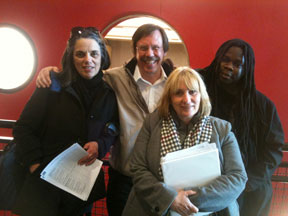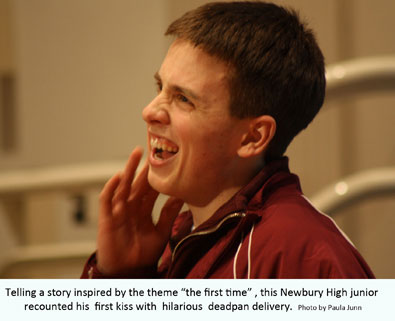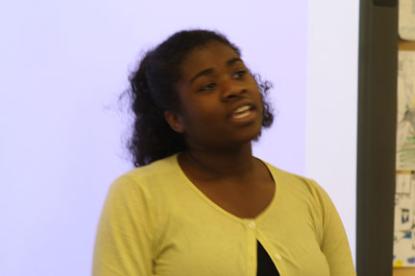 There is a bell or a buzzer and then–an explosion of noise! It’s the change of classes. Whether in Everett or Newburyport, we were carried on waves of energy and words from the quiet end of one class to the subdued beginning of the next. Yes! Here was the natural drive of teenagers to communicate and connect that we wanted to engage.
There is a bell or a buzzer and then–an explosion of noise! It’s the change of classes. Whether in Everett or Newburyport, we were carried on waves of energy and words from the quiet end of one class to the subdued beginning of the next. Yes! Here was the natural drive of teenagers to communicate and connect that we wanted to engage.
When we started teaching high school students we were pumped, ready and excited. It was also bit scary. Even though I have been teaching storytelling for decades, this was a high school program of greater depth and breadth than I had ever attempted. Would the “story magic” work as it always had in the past? I felt like I do about baking: all that careful measuring and planning, then the long wait to see how something turns out. I am too impatient to be a good baker. And human beings are not inert ingredients. And teaching is only a little like baking.
Still we planned and approached StoriesLive® like expert pastry chefs. The prep was way longer than the baking.
We had met with teachers and administrators and crafted our lessons down to the minute. In each school, students had seen our performances and a short workshop that followed had already elicited a few stories in each assembly. We had good materials. We had plans. But as any teacher knows, teaching is an art because the reproducible results of science are only possible when you have control of your materials. And humans are only partly “material.” Besides, our plan was to open up the world of junior and senior high school students to the creative energy in the art of storytelling. We were about release and direct energy, not controlling it. It seemed a natural fit. Especially as we walked in the halls from class to class– stories were being told all around us. But it was also a bit risky.
In some schools we were going to teach all the English classes in a cohort: all the juniors in Newburyport and  Everett and all the seniors in Lynn Classical High School. This was our dream come true, but it also happened all at once, from March 11th until April15th. It was way more students and classes than we had anticipated at one time, and it was a bear to organize. In the end we taught over 1,100 students in 5 high schools. This meant we had many students who are taking English Language Arts because it is required. And in some classes we struggled to get the students to open up and tell their personal stories. They all loved listening to stories, but telling their own? That was not on their agenda. At first.
Everett and all the seniors in Lynn Classical High School. This was our dream come true, but it also happened all at once, from March 11th until April15th. It was way more students and classes than we had anticipated at one time, and it was a bear to organize. In the end we taught over 1,100 students in 5 high schools. This meant we had many students who are taking English Language Arts because it is required. And in some classes we struggled to get the students to open up and tell their personal stories. They all loved listening to stories, but telling their own? That was not on their agenda. At first.
But things happen when you mix live stories and people. One good story calls another. Collectively we massmouth storytellers heard over a thousand stories. And by the time we had the mini- story slam in classrooms, all of the StoriesLive® storyteller-educators started to hear some amazing things.
In one of my classes a young man who was clearly in English class under protest, sat back and offered low-level disruption whenever he could. When his turn came, he grumbled a mild protest as he walked to the front of the class to present. Then he started to tell his story. He told about how when it was time for him to leave his country, his grandmother was so sad she would not stay to see him on board the airplane. Instead she left early and walked back, a long, long way from the city, to her home. Some years later, when she was very ill back home, he was riding in a car with his family. He had his iPod on, listening to his tunes. Then . . . he thought he heard the voice of his grandmother in his headphones. He heard her say “Goodbye, son.” It scared him. It seemed so real. But he kept it to himself because he knew his mother and whole family were worried about his grandmother.
When they got home the phone rang. It was the news that his grandmother had just passed. He ended by saying that he was glad that his grandmother had spoken to him one last time. He had established a context and the meaning and had created a clear beginning, middle, and end. There was a hushed respect and silence as he finished. Then there was a thunderous burst of applause. When I told the ELA department head that I just heard an amazing story from “Jorge,” she was more than mildly surprised. He was neither a participator, nor cooperative, nor an “A student,” but he had told something deep and important about his life. And he told it well.
And this is what we had wanted. A chance to show educators that oral expression is not only the natural format of language but also a discipline that can be learned. Given some tools and guidance, all students have a story and a voice. We wanted to show the teens that their stories mattered to each other and the wider community.
In One Thousand and One Nights, Scheherazade told stories to stay alive. Storieslive® was created to teach high school students the art of storytelling in part to keep storytelling alive. We created a new audience for storytelling and we showed students how they are more connected and alive to the possibilities of their lives by knowing and telling their own stories.
* * * *
 The StoriesLive® Scholarship High School slam is this Saturday, April 30th starting at 2:30 PM in the auditorium of the Cambridge Public Library (Main Branch). Free and open to the public, this event is supported by a Mass Humanities “Engaging New Audiences” grant and StoryStream, Cambridge’s city wide storytelling initiative. StoriesLive® has brought forth many more stories; poignant, funny, sad and joyful. Look here for more videos of student storytelling.
The StoriesLive® Scholarship High School slam is this Saturday, April 30th starting at 2:30 PM in the auditorium of the Cambridge Public Library (Main Branch). Free and open to the public, this event is supported by a Mass Humanities “Engaging New Audiences” grant and StoryStream, Cambridge’s city wide storytelling initiative. StoriesLive® has brought forth many more stories; poignant, funny, sad and joyful. Look here for more videos of student storytelling.


